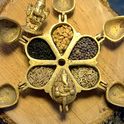What makes a good cook?
What do you think DEFINES a good cook? What are the markers?
19 Comments
WestcoastyOctober 19, 2015
I wanted to jump in here, because I am a newbie foodie and this is something I have been asking myself as I explore this new passion. I'm 50 years old and it wasn't until I first had very little money for food for a time (now happily over) so had to contrive, and then discovered the astonishing difference that organic vegetables make, that I finally learned to enjoy cooking. For the first time ever, I began to crave tasty, satisfying food.
As a kid, I was exiled to the kitchen to peel potatoes or carrots while everyone else watched tv. That and similar experiences led me to loathe cooking most of my life, because I thought of it as lonely, difficult, and too much work for the results. I still don't think of myself as a "good" cook, because I have so much to learn. But I adore feeding delicious food to my partner and our guests. So for me, ultimately, if you make your food with love, and delight your guests' tastebuds and tummies...you pass the "good cook" test. Maybe we don't wear the crown every day, but I for one am very proud and happy on the days that I do.
As a kid, I was exiled to the kitchen to peel potatoes or carrots while everyone else watched tv. That and similar experiences led me to loathe cooking most of my life, because I thought of it as lonely, difficult, and too much work for the results. I still don't think of myself as a "good" cook, because I have so much to learn. But I adore feeding delicious food to my partner and our guests. So for me, ultimately, if you make your food with love, and delight your guests' tastebuds and tummies...you pass the "good cook" test. Maybe we don't wear the crown every day, but I for one am very proud and happy on the days that I do.
AntoniaJamesOctober 15, 2015
Fearless, adaptable, generous, questioning, humble, quiet master of the kitchen. ;o)
P.S. The first, fearless, is non-negotiable. If I had any say in the editorial style manual of a food media company, I'd put "intimidated," "daunting," "terrified," "frightening," "scared," "afraid," and all synonyms and related terms at the top of the banned words list. Fear is simply not an option.
P.S. The first, fearless, is non-negotiable. If I had any say in the editorial style manual of a food media company, I'd put "intimidated," "daunting," "terrified," "frightening," "scared," "afraid," and all synonyms and related terms at the top of the banned words list. Fear is simply not an option.
Jenny M.October 15, 2015
Hunger makes the best cook, quote Laura Ingalls Wildet (or her mom)
scruzOctober 14, 2015
there are very few things in life as basic as food. those of us who were lucky enough to have grown up in a traditions where food is carefully chosen, has quality, nutrition, cultural aspects, and a social/familial context OR who now can create our own for us and the next generation are so very lucky. this is almost a dead tradition. we can save money, please people, help heal them and give a gift of ourselves by what happens and comes out of our kitchens. one doesn't need to master the whole realm or butchering, baking, cooking roasting, grilling, skinning, scaling, filleting etc to to bring a smile of contentment to ourselves and others. it is a gift that is not always recognized, but there is nothing as satisfying as thinking back to the triumphs, the goofs, shared times of plucking chickens, sharing special meals to weave a very strong string through life. it is a wonderful topic for discussion here. thanks. i love reading the answers. and my mom, the good cook, had hands smelling wonderfully of celery, onions and herbs after making thanksgiving dressing that i loved to put over my face when i was tiny.
Sippity S.October 14, 2015
Whatever the meal. Whatever the occasion. To me it’s a matter of satisfaction.
An important dinner for the boss, a casual lunch with friends, or hot soup for a child with a cold. It doesn’t matter what the occasion is. “The cook’s first job is to delight”. Delight the spouse. Delight the family. Delight thyself. However, we cooks have further responsibilities. We have to be nutritionists as well as time and money managers. Once our job is done there might be a “thanks hon” or a grateful smile, but we’re often left alone, elbow deep in dishes, while the rest of the family goes back whatever they were up to when the dinner bell rang. But the kitchen is our domain and we shouldn’t take that job lightly. We’re the Captains of Cuisine and the best of us will go down with the skillet if need be.
I’m making light of it, but I’m trying to say that as chief cook and bottle washer our responsibilities go further than just getting it on the table.
Which sometimes means embracing the mundane. So plan, procure, and slow down. Find pleasure in waiting for a watched pot to boil. Embrace the peeling of a carrot. It might be easier to buy a carrot that is already peeled, but the difference will be astounding. Done right carrots can delight.
PS. The quotation marks denote a quote I remember hearing. I just can't remember where I heard it. GREG
An important dinner for the boss, a casual lunch with friends, or hot soup for a child with a cold. It doesn’t matter what the occasion is. “The cook’s first job is to delight”. Delight the spouse. Delight the family. Delight thyself. However, we cooks have further responsibilities. We have to be nutritionists as well as time and money managers. Once our job is done there might be a “thanks hon” or a grateful smile, but we’re often left alone, elbow deep in dishes, while the rest of the family goes back whatever they were up to when the dinner bell rang. But the kitchen is our domain and we shouldn’t take that job lightly. We’re the Captains of Cuisine and the best of us will go down with the skillet if need be.
I’m making light of it, but I’m trying to say that as chief cook and bottle washer our responsibilities go further than just getting it on the table.
Which sometimes means embracing the mundane. So plan, procure, and slow down. Find pleasure in waiting for a watched pot to boil. Embrace the peeling of a carrot. It might be easier to buy a carrot that is already peeled, but the difference will be astounding. Done right carrots can delight.
PS. The quotation marks denote a quote I remember hearing. I just can't remember where I heard it. GREG
SilverSageOctober 14, 2015
I like the quote. It's Lauren Costello in 'Notes on Cooking'. Available on Amazon.
boulangereOctober 14, 2015
Love. Of aromas, of good ingredients, of a treasured pot deep in history in which to cook, of people with whom to share, of quiet time spent at the end of each long day nourishing oneself and family with plates and bowls of goodness.
lapadiaOctober 14, 2015
To DEFINE a good cook in my mind is simple:
It is playful work in the kitchen; using ones innate intuition, fun spirit and curiosity.
It’s tapping special abilities to bring out the essence and colors of food, as well as the process taken to a final creation.
One who shares with others to elicit fond memories, smells, sounds, tastes, visuals and love of its art.
Joseph Campbell said, “Follow your bliss,” and for me, that describes all of the above.
It is playful work in the kitchen; using ones innate intuition, fun spirit and curiosity.
It’s tapping special abilities to bring out the essence and colors of food, as well as the process taken to a final creation.
One who shares with others to elicit fond memories, smells, sounds, tastes, visuals and love of its art.
Joseph Campbell said, “Follow your bliss,” and for me, that describes all of the above.
Kristen W.October 14, 2015
The answers listed above are wonderful, inspiring, and, I believe, true. It occurs to me also that on the more left-brain side, good planning and organizational skills also hugely facilitate being able to get into "the zone" when preparing a dish. When I feel I am really rocking with the preparation of a dish, the components, their size and shape, their grouping and the order in which they are added, the techniques that apply to the various components, and even their proximity to the heat element when there is one, have all been planned out ahead. The dish HAS to work because the process was airtight.
Ironically , this also allows for seamless improvisation to happen when desired because the cook isn't busy putting out fires -- so to speak -- so there is time and space for the imagination to flourish. Part of my development as a cook has been the development of my ability to conceive of a dish (whether it be my recipe or another's) and then plot the trajectory of it's preparation accurately from start to finish mentally, before the cooking starts. A kind of "nuts and bolts" aspect of it, but, I feel, essential nonetheless.
Ironically , this also allows for seamless improvisation to happen when desired because the cook isn't busy putting out fires -- so to speak -- so there is time and space for the imagination to flourish. Part of my development as a cook has been the development of my ability to conceive of a dish (whether it be my recipe or another's) and then plot the trajectory of it's preparation accurately from start to finish mentally, before the cooking starts. A kind of "nuts and bolts" aspect of it, but, I feel, essential nonetheless.
BeviOctober 13, 2015
Someone who makes sharing her food a comfortable experience for friends and family. Someone who welcomes strangers to her table and treats them with respect and a sincere desire to know more about them. Also, cooking with others in a generous and accepting manner, whether your cooking companions are beginners or old hands in the kitchen. It's so nice to trade off tasks with good kitchen buddies, and see how their methods of preparing a dish differ from your way.
NancyOctober 14, 2015
Bevi, I agree with you whole-heartedly.
In addition to all the great comments so far, I see a good cook as one who uses all the technique, good provisions, curiosity et al to serve ones family, household and guests...make them comfortable, provide food that suits the day, the occasion, their ages, their illnesses (if any), their moods.
This is not, I emphasize, the home cook as restaurateur, providing for every mood, allergy & aversion as they blow through our kitchen.
Rather, the cook as relaxed host, providing for others. Your expertise may shine, quietly, as people eat, talk, enjoy the evening. Meanwhile, you have made your table their home, for however short or long.
In addition to all the great comments so far, I see a good cook as one who uses all the technique, good provisions, curiosity et al to serve ones family, household and guests...make them comfortable, provide food that suits the day, the occasion, their ages, their illnesses (if any), their moods.
This is not, I emphasize, the home cook as restaurateur, providing for every mood, allergy & aversion as they blow through our kitchen.
Rather, the cook as relaxed host, providing for others. Your expertise may shine, quietly, as people eat, talk, enjoy the evening. Meanwhile, you have made your table their home, for however short or long.
PanfusineOctober 13, 2015
Passion, - to create food that makes your family happy. The passion that incites the need to drive to the store even if it is just for that one ingredient missing from your pantry, just so that you can get the dish done to perfection. the gurgling bubbling joy of getting to play with the cornucopia of seasonal ingredients that appear throughout the year. and the pragmatism to accept the occasional 'failure of a recipe that goes haywire and move on.
StephanieOctober 13, 2015
Respect. It seems to me that it all boils down to that one word. Respect for food, directions, history, others, and yourself.
Respect for the food, certainly. Using fresh ingredients and handling them properly; but beyond that, respect for the process (following directions), respect for those who have come before and the knowledge they can impart (reading and listening), respect for time.
Respect for the people you are cooking for. Compassion for individual tastes and dietary needs. Respect for yourself - appreciating the gift you're giving, using your intuition, not being too critical, taking compliments with grace.
Respect for the food, certainly. Using fresh ingredients and handling them properly; but beyond that, respect for the process (following directions), respect for those who have come before and the knowledge they can impart (reading and listening), respect for time.
Respect for the people you are cooking for. Compassion for individual tastes and dietary needs. Respect for yourself - appreciating the gift you're giving, using your intuition, not being too critical, taking compliments with grace.
Susan W.October 13, 2015
I've been thinking a lot about this lately. I think I've decided that constantly learning and not staying stuck in the methods that you learned ten years ago is a sign of a good cook. I'm not saying that holds true with everything, but I've noticed I've learned more from keeping an open mind than anything.
A sense of what works and what doesn't as far as flavors and textures go is a skill that most good cooks seem to have. However, Yotam Ottolenghi often blows that theory out of the water. He rises above the typical and seems to have an uber sense of bringing seemingly oddly matched ingredients together in deliciousness.
Having great respect for the freshest and best ingredients that my budget allows can take a rather plain and simple recipe and elevate it to new heights.
So many answers to this question, but I'll stop there.
A sense of what works and what doesn't as far as flavors and textures go is a skill that most good cooks seem to have. However, Yotam Ottolenghi often blows that theory out of the water. He rises above the typical and seems to have an uber sense of bringing seemingly oddly matched ingredients together in deliciousness.
Having great respect for the freshest and best ingredients that my budget allows can take a rather plain and simple recipe and elevate it to new heights.
So many answers to this question, but I'll stop there.
CavOctober 13, 2015
I've long been of the mindset that if you stop learning then you're dead in the water. This applies to pretty well everything, but in the cooking realm, if you want to be a good cook, it's especially important. You never know when a method or technique will arise that could save the home cook a precious ten minutes, be it a brand new way or the exorcising of a traditional method. Or bring more flavour to your world. Always be the pupil. No technique, no method, no recipe no pot is ever perfect, ever the best it can be.
To always be the pupil means you're always seeking, curious, investigating, discovering and experimenting. Then, and here for me is the mark of a good cook, you want to and get to share. When people talk of cooking with love, for me that means you want to share. Not to impress but to take a dish to the table and say Isn't this awesome! And then everyone eats.
As Susan W says, there's many answers to this question but for me comes down to wanting to share marvels with your world. And to take that extra step or two that makes it wonderful.
Though to conclude, I must paraphrase the great Fergus Henderson:
To be a good cook do not be afraid of the food. It will know and it will misbehave.
To always be the pupil means you're always seeking, curious, investigating, discovering and experimenting. Then, and here for me is the mark of a good cook, you want to and get to share. When people talk of cooking with love, for me that means you want to share. Not to impress but to take a dish to the table and say Isn't this awesome! And then everyone eats.
As Susan W says, there's many answers to this question but for me comes down to wanting to share marvels with your world. And to take that extra step or two that makes it wonderful.
Though to conclude, I must paraphrase the great Fergus Henderson:
To be a good cook do not be afraid of the food. It will know and it will misbehave.
NiknudOctober 13, 2015
Well you tagged this question with cook, chef, and home cook. I guess I'll respond to the home cook part since that is what I am. For me, being the home cook for my family means I am gleefully responsible for nourishing my husband and children. Not just in providing them with tasty meals and school lunches but nourishing them in every sense of the word. That means making chicken soup when they are sick, celebratory cookies when they triumph and exposing them to new and exciting food, in sharing my joy of food with them. It means that I send my children out into the world in ten years or so knowing what good food is, how to roast a chicken, how to make a marinara, how to feed themselves and the families I hope they have one day. It means passing down my great grandmother's chocolate cake recipe while telling them about my memories of making it with her when I was three. It means, whether my grandmother is there or not, making her pierogis at Christmas. It means remembering calling my dad in tears, not long after I first got married, when my brisket resembled most closely a piece of shoe leather and having him talk me down off the ledge. It means a little boy on each side of me, helping make pancakes (and traditions of our own) on Saturday mornings complete with egg shells in the batter and burnt butter on the skillet. For me, cooking IS home and I can't separate it out from the emotional components. Even though it helps to be able to read a recipe, make biscuits from scratch, and get dinner to the table in between soccer games and homework - which is probably more along the lines of what you were looking for.
That may have been a little heavy for the Hotline, but it's what I thought of first.
That may have been a little heavy for the Hotline, but it's what I thought of first.
StephanieOctober 13, 2015
Beautifully said. I love that phrase you used, "gleefully responsible for nourishing."
ChefJuneOctober 13, 2015
You just described my mom! That is what she gave to me. And what I hope I've passed along. The highest compliment I ever received on my cooking was when I heard my mom tell a friend that I was a much better cook than she. WOW!
NiknudOctober 13, 2015
I agree ChefJune! Nothing makes you feel prouder than watching your mom eat some of your cooking with gusto - Congrats! Isn't it funny how so much of our sense of family is wrapped up in food and eating? I remember when my gram sent me a whole box of homemade chocolate bark when I was in Iraq. Not saying it survived the journey intact or anything, but I opened up the box and smelled home and (not that I'd admit it or anything) burst into happy tears. :)

Showing 19 out of 19 Comments
Recommended by Food52
Popular on Food52
Continue After Advertisement











